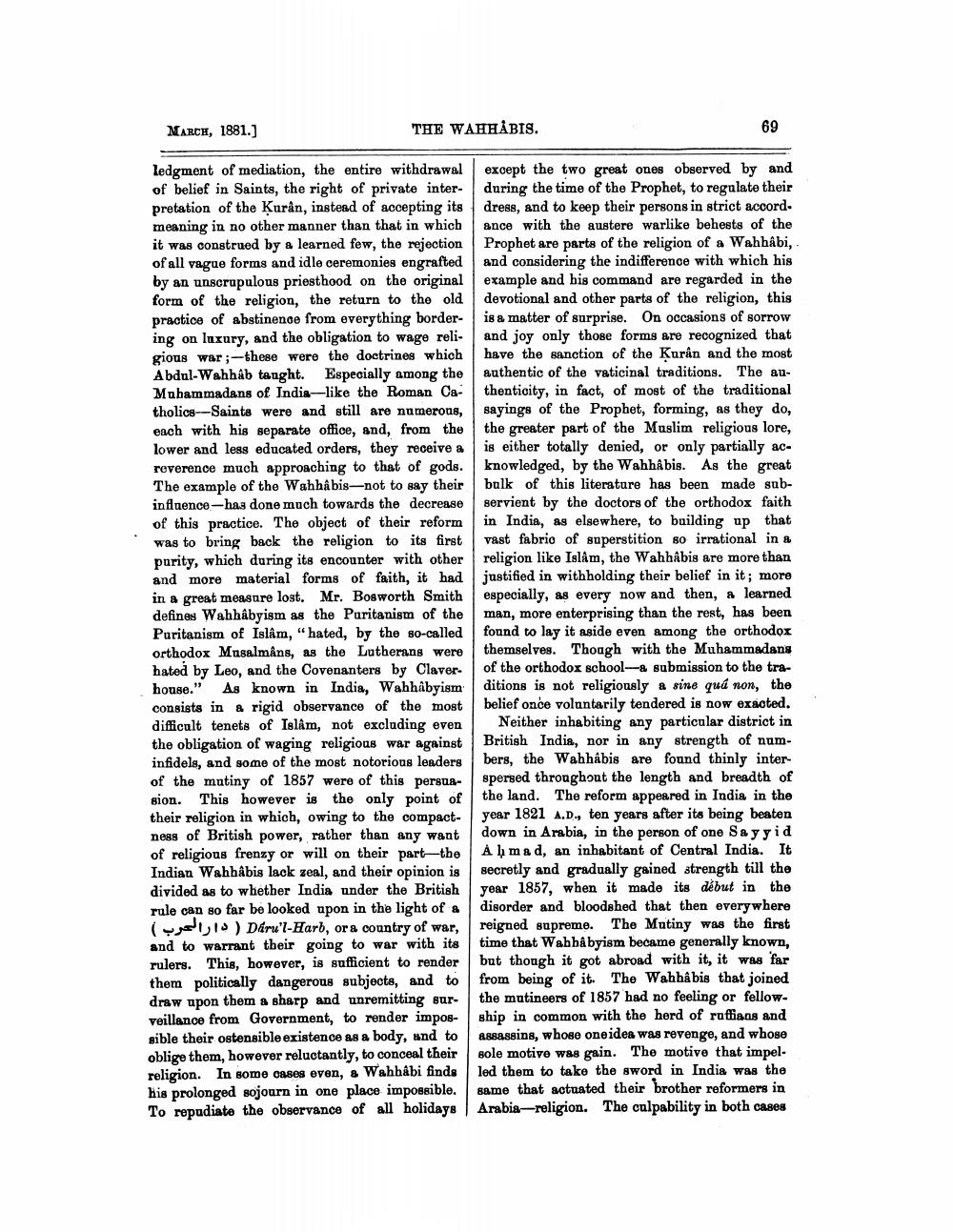________________
THE WAHHABIS.
MARCH, 1881.]
ledgment of mediation, the entire withdrawal of belief in Saints, the right of private interpretation of the Kurân, instead of accepting its meaning in no other manner than that in which it was construed by a learned few, the rejection of all vague forms and idle ceremonies engrafted by an unscrupulous priesthood on the original form of the religion, the return to the old practice of abstinence from everything bordering on luxury, and the obligation to wage religious war;-these were the doctrines which Abdul-Wahhab taught. Especially among the Muhammadans of India-like the Roman Catholics-Saints were and still are numerous, each with his separate office, and, from the lower and less educated orders, they receive a reverence much approaching to that of gods. The example of the Wahhâbis-not to say their influence-has done much towards the decrease of this practice. The object of their reform was to bring back the religion to its first purity, which during its encounter with other and more material forms of faith, it had in a great measure lost. Mr. Bosworth Smith defines Wahhâbyism as the Puritanism of the Puritanism of Islâm, "hated, by the so-called orthodox Musalmâns, as the Lutherans were hated by Leo, and the Covenanters by Claverhouse." As known in India, Wahhâbyism consists in a rigid observance of the most difficult tenets of Islâm, not excluding even the obligation of waging religious war against infidels, and some of the most notorious leaders of the mutiny of 1857 were of this persuasion. This however is the only point of their religion in which, owing to the compactness of British power, rather than any want of religious frenzy or will on their part-the Indian Wahhabis lack zeal, and their opinion is divided as to whether India under the British rule can so far be looked upon in the light of a (1) Daru'l-Harb, or a country of war, and to warrant their going to war with its rulers. This, however, is sufficient to render them politically dangerous subjects, and to draw upon them a sharp and unremitting surveillance from Government, to render impossible their ostensible existence as a body, and to oblige them, however reluctantly, to conceal their religion. In some cases even, a Wahhabi finds his prolonged sojourn in one place impossible. To repudiate the observance of all holidays
69
except the two great ones observed by and during the time of the Prophet, to regulate their dress, and to keep their persons in strict accordance with the austere warlike behests of the Prophet are parts of the religion of a Wahhabi, and considering the indifference with which his example and his command are regarded in the devotional and other parts of the religion, this is a matter of surprise. On occasions of sorrow and joy only those forms are recognized that have the sanction of the Kurân and the most authentic of the vaticinal traditions. The authenticity, in fact, of most of the traditional sayings of the Prophet, forming, as they do, the greater part of the Muslim religious lore, is either totally denied, or only partially acknowledged, by the Wahhabis. As the great
bulk of this literature has been made subservient by the doctors of the orthodox faith in India, as elsewhere, to building up that vast fabric of superstition so irrational in a religion like Islâm, the Wahhâbis are more than justified in withholding their belief in it; more especially, as every now and then, a learned man, more enterprising than the rest, has been found to lay it aside even among the orthodox themselves. Though with the Muhammadans of the orthodox school-a submission to the traditions is not religiously a sine quá non, the belief once voluntarily tendered is now exacted.
Neither inhabiting any particular district in British India, nor in any strength of numbers, the Wahhabis are found thinly interspersed throughout the length and breadth of the land. The reform appeared in India in the year 1821 A.D., ten years after its being beaten down in Arabia, in the person of one Sayyid Ahmad, an inhabitant of Central India. It secretly and gradually gained strength till the year 1857, when it made its debut in the disorder and bloodshed that then everywhere reigned supreme. The Mutiny was the first time that Wahhâbyism became generally known, but though it got abroad with it, it was far from being of it. The Wahhabis that joined the mutineers of 1857 had no feeling or fellowship in common with the herd of ruffians and assassins, whose one idea was revenge, and whose sole motive was gain. The motive that impelled them to take the sword in India was the same that actuated their brother reformers in Arabia-religion. The culpability in both cases




